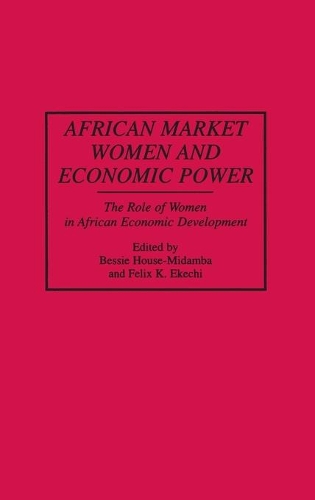
African Market Women and Economic Power: The Role of Women in African Economic Development
(Hardback)
Publishing Details
African Market Women and Economic Power: The Role of Women in African Economic Development
By (Author) Felix K. Ekechi
By (author) Bessie House-Midamba
Bloomsbury Publishing PLC
Praeger Publishers Inc
11th January 1995
United States
Classifications
Tertiary Education
Non Fiction
Labour / income economics
Political science and theory
305.42096
Physical Properties
Hardback
240
Description
An interdisciplinary study of market women from all parts of Africa shows how, from historical times to the present, African women have used the economic power they have derived from market activities and commercial enterprises to improve their social and political status in a man's world. They used their wealth in pre-colonial times to obtain titles and even chieftainship. Because of their involvement in trade, many women acquired considerable property, especially real estate. The authors stress the positive aspect of women's economic activities, but also point out the prevalent sexual division of labor in Africa as a limiting factor. They illustrate the concomitant struggle between men and women over certain market items traditionally associated with one or the other sex. They analyze the cultural, social, and economic barriers that restrict female involvement in some economic activities. Nevertheless, the overwhelming conclusion by all of the writers, who are Africans and Americans, is that women play a major role in the economic sector of all the regions of the continent.
Reviews
Most literature on women in African development discusses the role of women in West African societies. One of the principal virtues of this collection is that it examines women in West, East, and Southern Africa. There are ten essays in all, many of them with useful tables and maps. The time frame encompasses the pre-colonial, colonial, and independent periods. Contributors highlight the many ways in which African women have adapted and changed over the decades as they have found new means to remain viable in the economies of their countries. Upper-division undergraduates, graduate students, and faculty.-Choice
"Most literature on women in African development discusses the role of women in West African societies. One of the principal virtues of this collection is that it examines women in West, East, and Southern Africa. There are ten essays in all, many of them with useful tables and maps. The time frame encompasses the pre-colonial, colonial, and independent periods. Contributors highlight the many ways in which African women have adapted and changed over the decades as they have found new means to remain viable in the economies of their countries. Upper-division undergraduates, graduate students, and faculty."-Choice
Author Bio
BESSIE HOUSE-MIDAMBA is Assistant Professor of Political Science at Kent State University. She is the author of Class Development and Gender Inequality in Kenya, 1963-1990 (1990). FELIX K. EKECHI is Professor of History at Kent State University. He is the author of Missionary Enterprise and Rivalry in Igboland (1972) and Tradition and Transformation in Eastern Nigeria (1989).
